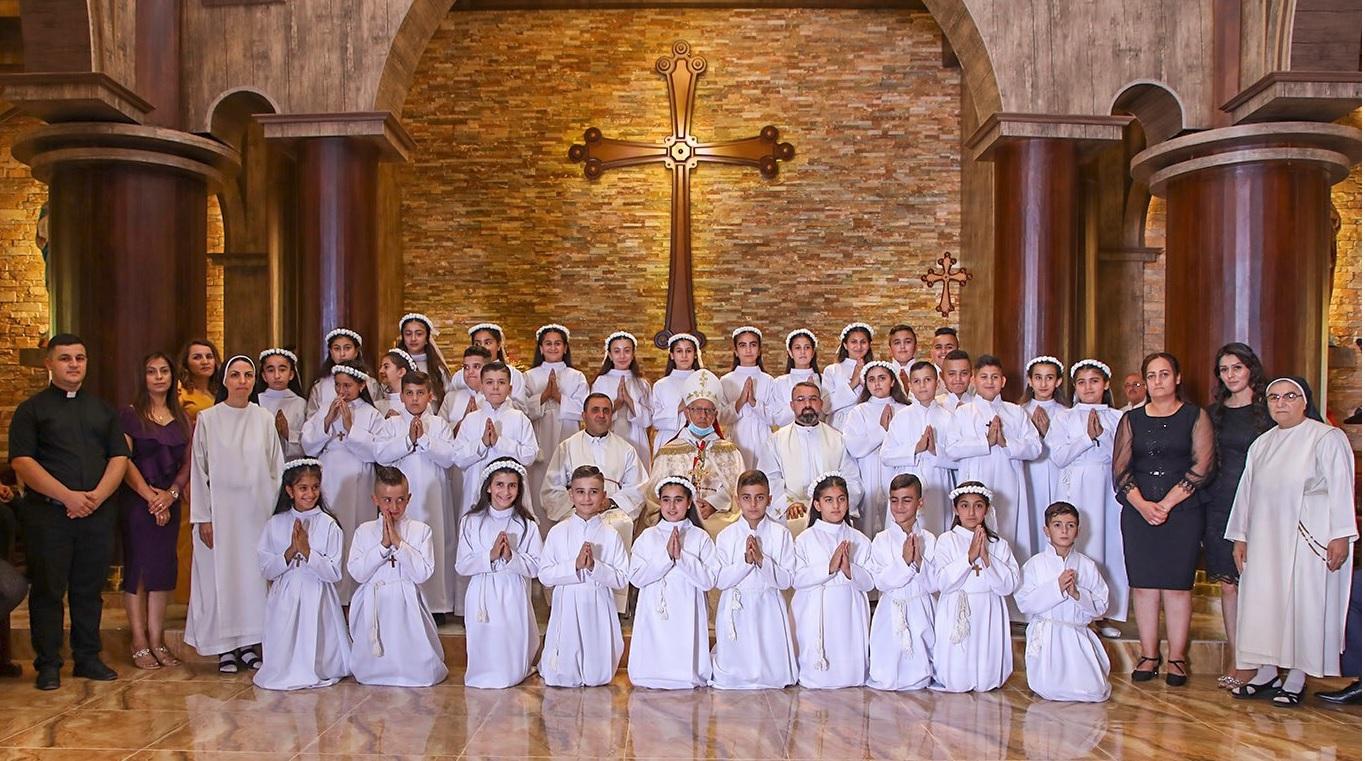ROME – As Iraqis sort through the rubble of the latest terrorist attack Tuesday, an attack on a busy market in downtown Baghdad that left at least 30 people dead, one Catholic priest in Iraq says it’s important not just to focus on the horror of life in the country but also the hope.
As it happens, the bombing came four days after 70 children received their first communion in the city of Telskuf in the Nineveh Plains, a region in northern Iraq that borders with the Kurdistan region, and which was invaded by IS in 2014.
Father Karam Shamasha shared on Twitter the image of the 70 children, all dressed in pristine white, on Sunday, noting that the region from where they hail “was heavily attacked by Islamic State militants a few years ago to exterminate Christians, scream out loud today: Our Faith and our Cross have won.”
On Tuesday, he told Crux that it’s “not easy to explain the emotions I had seeing these children all born in times of war. They have never known what peace is.”
Yet the possibility on Friday to “sing and praise the Lord in Aramaic, the language of Jesus, was truly an occasion for my whole country, so many families came from outside the country to share these important moments for the life and faith of our children and the future of Christianity in our land,” Shamasha said.
Tuesday’s attack came when a device exploded in the al-Wuhailat market, in the northern Sadr City area, as families prepared for the Islamic festival of Eid al-Adha. It was the deadliest bombing in Baghdad in six months.
Pope Francis sent a telegram renewing his prayers so that “no act of violence will diminish the efforts of those who strive to promote reconciliation and peace in Iraq.”
Francis, “deeply saddened to learn of the loss of life,” sent a telegram through his Secretary of State, Cardinal Pietro Parolin, in which he expressed his condolences to the families and friends of those who have died.
The Argentine pontiff became the first pope to visit Iraq last March.
The terrorist organization Islamic State, which perpetrated genocide against Christians, Yazidis and other minorities during their reign of terror in northern Iraq and Syria between 2014 and 2017, claimed responsibility for Tuesday’s bombing, saying one of its members detonated an explosive vest.
RELATED: Iraqi priest doubles down on Christianity’s survival in the Middle East
Shamasha sees a striking juxtaposition between the carnage in Baghdad and the scenes on the Nineveh Plains. Confession was available for the children and their families before Mass, and emotions ran high, the priest said.
Those who made their first communion, as Shamasha explained, know nothing of the thriving communities that one lived in the Nineveh Plains, for centuries considered a Christian stronghold in the Middle East, anchored by a series of traditionally Christian villages. In fact, when ISIS first arose, many experts toyed with the idea of encouraging Christians from elsewhere to move there as a safe haven.
But ISIS arrived in 2014 and things changed overnight: more than 100,000 Christians were forced to flee and their villages were gutted. Churches, monasteries, businesses and private homes were torched, torn down, or badly defaced. With the help of the Nineveh Plains Reconstruction Project, organized and led by the local churches, and backed by donors such as the papal foundation Aid to the Church in Need and the Knights of Columbus, places such as Qaraqosh, Teleskof, Karamless, Alqosh have been rising from the ruins since late 2017.
Today, however, those towns are rising from the ashes, and many Christians, though not all, are coming back. Places with names such as Qaraqosh, Teleskof, Karamless, Alqosh, and others, are once again thriving Christian communities, with big plans for the future.
Hence the importance of 70 children receiving their first communion on Friday, according to Shamasha.
“We saw the joy and hope in the eyes of the families after the dark days of 2014, that began with the invasion of Islamic terrorists on August 6, 2014,” he said.
On the heels of the deadly terrorist attack, Friday’s celebration was a timely reminder as to why many, including Shamasha, believe Christians are the “salt of the earth” in the Nineveh Plains.
Follow Inés San Martín on Twitter: @inesanma














